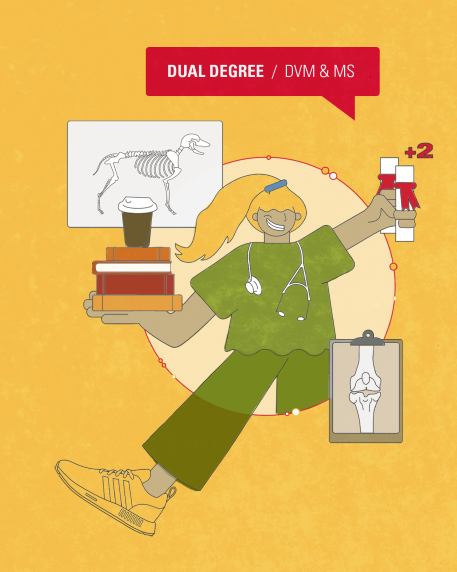Students may be concurrently enrolled in the professional curriculum leading to the DVM degree and in a graduate program after completion of 90 credits of pre-veterinary or professional course work. Students enrolled in the Veterinary Preventive Medicine thesis and nonthesis M.S. degree program are required to maintain a grade point average of 3.0 or higher in the veterinary curriculum. Students are subject to normal rules and procedures of both colleges. Degree requirements for the MS are identical, whether you are in a concurrent program or not; however, it is anticipated that students would enroll in selected veterinary courses for graduate credit.
If a student does not hold a B.S. or B.A. degree, a graduate degree would not be granted until all requirements for the D.V.M. degree are completed. By not restricting credits earned, a student may pursue graduate studies during summer and holiday sessions and may elect to postpone the fourth year of professional curriculum for one year in order to facilitate pursuit of graduate courses and research. This latter option may be declared during the second or third year of the professional curriculum, and no later than the first day of the spring semester of the third year of the professional curriculum. It is anticipated that completion of both degrees within a four-year period would require students to enroll in one or more summer sessions.
Refer to the Graduate College Handbook for additional information on the concurrent degree program.
Courses for Concurrent Students
Students enrolled in the Graduate College will satisfy all academic requirements established by the Graduate College. In meeting these requirements, the only courses in the Veterinary College eligible for graduate credit will be courses identified in the ISU Bulletin as being available for graduate credit. Students enrolled in the concurrent program may elect to use courses from their graduate Program of Study, where applicable, to meet the requirements in effect for the professional curriculum, provided approval is obtained from the Curriculum Committee and the Administration of the College of Veterinary Medicine. At present, these include VMPM 586 Medical Bacteriology; VMPM 586 Medical Bacteriology Laboratory; VMPM 587 Animal Virology; VMPM 587 Animal Virology Laboratory; VPth 542 General Pathology; VPth 576 Veterinary Parasitology; and VDPAM 426 Veterinary Toxicology. In order for a graduate course to be acceptable as a substitute for a designated professional course in the Veterinary Curriculum, it shall be reviewed by the CVM Curriculum Committee for breadth necessary for the professional curriculum and by the College Graduate Studies Committee for depth and rigor appropriate for graduate education.
When a student takes any courses in the professional veterinary curriculum, registration is as a veterinary student, and tuition and fees are assessed according to that status. When only graduate courses are taken (e.g., during summer session), the student should complete a “Change of Curriculum” form in the Graduate College to change to graduate student status with tuition assessed on that basis.

